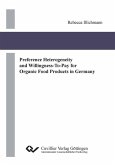This thesis is focused on empirical examinations of commodity derivatives. Commodity futures and options are very important for companies in hedging their commodity price risks. Financial institutions participate also in commodity derivative markets either to gain exposure to commodity prices, diversify their portfolios, or hedge commodity price risk from financial transactions. But also retail investors have been more and more interested in commodity investments for some years. Because of their limited access to commodity markets, they have to rely on special commodity SFPs issued by banks. However, in contrast to derivatives with standard underlyings, such as stocks or bonds, there are various specific aspects to commodity derivatives. Especially interesting from academic as well as practitioners’ point of view are the pricing relations between spot and derivative prices, which are closely linked to market fundamentals. But also from the financialization of commodity markets arise several subjects which require scientific examination. I identify in this thesis several unresolved research questions on commodity futures, options, and SFPs. This way it is possible to offer insights in derivative markets for industrial companies, financial institutions, and retail investors alike.
Dieser Download kann aus rechtlichen Gründen nur mit Rechnungsadresse in A, B, BG, CY, CZ, D, DK, EW, E, FIN, F, GR, HR, H, IRL, I, LT, L, LR, M, NL, PL, P, R, S, SLO, SK ausgeliefert werden.









